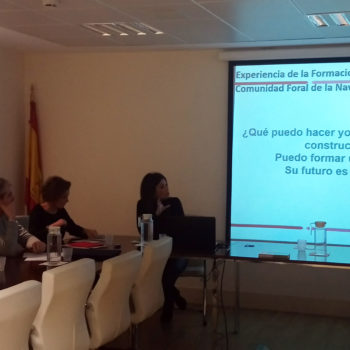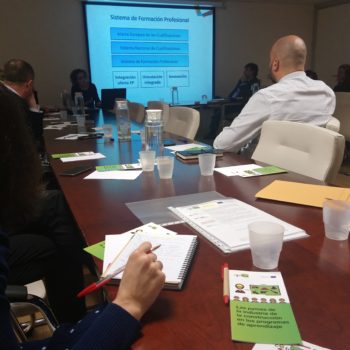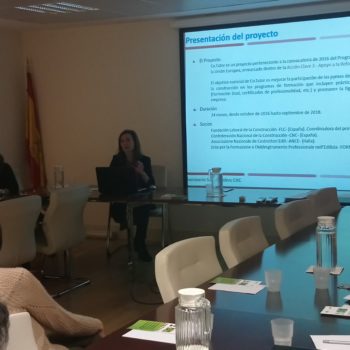

On Tuesday, February 6, the National Construction Confederation (CNC) organized at its headquarters in Madrid a support seminar with its territorial managers on the European project CoTutor, which was attended by more than twenty representatives of companies from the construction industry.
At the meeting, inaugurated by the General Secretary of the CNC, Pedro Fernández Alén, the Director of the Vocational Training Service (VT) of the Education Department of the Regional Government of Navarre, Esther Monterrubio Ariznabarreta, spoke about the “Role of the Administration” Public in the Dual Vocational Training system”.
For its part, the head of Training of the Fundación Laboral de la Construcción of Navarre, Marta Silvero Miramón, exposed the “Experience of Dual Vocational Training in the Autonomous Community of Navarre”. And the director of the International Department of the CNC, Mª Ángeles Asenjo Dorado, together with the head of International Projects of the joint entity, Javier González López, presented the project CoTutor and the results of the European initiative reached to date.
VET is close to business demands
“There is a mismatch between the demand for training of students and their employment,” said Esther Monterrubio. Among other issues, due to this imbalance, the regional administration proposed to carry out a process of reflection and transformation to reinforce the quality and relevance of VET and learning throughout professional life, through a thoughtful Strategic Plan of Vocational Training in Navarra (2017-2020), which will take them to fit what companies demand and what students need.
Monterrubio stressed that the VT contributes value to the economic and social development in three facets: in the performance of the company, the training is integrated in the management of the Human Resources of the companies; and there is a clear improvement in productivity, according to performance indicators, although the benefits and costs are not short-term. Regarding social equity, the education system is a clear transmitter of values and VET, crucial in the transition from the education system to the world of work. In addition to the importance of the presence of companies in the VT. And in relation to macroeconomics, there is a greater impact in countries where VET is based on “learning”, it is reflected as a participatory process of all citizens and reflects the good relationship between training and productivity.
Among the challenges facing the VT, Monterrubio pointed out the improvement in training for students to achieve a global profile with: skills, technical skills, digital skills, problem solving, social skills, communication, teamwork, autonomy, etc.
To reinforce the quality and relevance of VET and lifelong learning, Navarre launched its Strategic Plan, after making a self-criticism, through the results of a SWOT analysis, and considered: promoting the tools that favor the professional insertion, increase the competitiveness of the Navarrese companies, guarantee the economic sustainability of the region, improve the social cohesion and assure the qualification and professional qualification.
Sharing training with the company
As Monterrubio said, when Dual VT complies with the above premises, it promotes a greater involvement of companies in the training of VET students, it generates an improvement in the coordination and updating of training and enables the incorporation of innovative technologies and techniques. In addition, the student improves their learning with access to facilities and equipment not available in schools and with social and personal values of the work activity.
For students it is an opportunity, since they learn and practice skills in the workplace, face real scenarios, obtain greater specialization, and have a transition to the labor market, in which they generate a link with the company and the support and follow-up of the teacher.
And also, for the company, since it participates directly in the design of the training program attending to the needs of its business, there is greater involvement and commitment on the part of the professionals, as well as a better labor and social integration of the workers in the company. company. In addition, to contribute to the social image of the company and generate a “feeling of belonging”.
As a success case, Monterrubio gave the example of the apprenticeship program of Volkswagen Navarra, with training contents designed by company specialists, in collaboration with technicians from the Education Department of the Government of Navarre, flexibility in time distribution and specialized programs developed under the concept of Dual Training. And with an accreditation endorsed by the Government of Navarra, AHK and Volkswagen Navarre.
The future of an apprentice is the future of the sector
Marta Silvero posed an initial question: “What can I do for the future of construction?”, To give an immediate answer: “I can train an apprentice, because his future is my future”. For the head of Training of the Fundación Laboral de la Construcción of Navarre is essential to analyze the value that training has for the construction industry and the level of qualification that has required the sector: “We talk about a cultural change, a change of management model and a change in the way of understanding the sector, “he said.
Silvero said that, during the academic year 2013/2014, an experimental program of Dual FP was carried out, in which, among the selection of titles, was the Operation and Maintenance of Construction Machinery (currently the second Technician in Excavations and Surveys) that is taught in the training centers of the Foundation in Navarre.
This experimental program stands out for having a series of curricular characteristics, specifically adapted to Dual VT, such as:
- Flexibility of calendar and schedules, in consensus with the company.
- Specific Dual VT Agreement.
- Module of Training in Work Centers (TWC) and Project integrated in the training part of which the company is responsible.
- Minimum curricular contents established by the training center.
- Dual VT as an opportunity to complement training in real practices.
- Complementarity of resources and outsourcing of specific contents to favor real experiential learning.
- Periods of real alternation in the company and in the center.
- Responsible role of the company in the teaching-learning process.
The level of labor insertion of the students of the Fundación Laboral de la Construcción of Navarre is 70% and it has 34 agreements of Dual VT practices signed with Navarran companies, according to Silvero.
However, the head of Training ensures that the industry still has challenges to achieve, among others, that the training center and the company look towards a common goal, that curricular minimums are defined and a company training program and that perform an evaluation system and monitoring devices for student learning. And on the part of the trainers, as a “new VT paradigm”, it is necessary to train trainers in the training center and in the company, through a set of new pedagogical models, of communication, of management and of labor insertion and training. associated
Marta Silvero also released a study on the figure of the company tutor, applied to the construction industry in Navarre (2009), from which you can draw some conclusions that are still valid:
- The construction companies of Navarra present a lack of knowledge of the figure of the company tutor in the framework of the TWC modules included in the curricula of the Specific Vocational Training qualifications of the professional family “Building and Civil Works”.
- The Training Programs for Company Tutors of the TWC Specific Vocational Training modules are expected to be reduced to information actions.
- The Business Tutors of the TWC modules of Specific Vocational Training for Construction and Civil Works, present training needs in order to adequately perform their role as such.
Improving the participation of SMEs in apprenticeship programs
Mª Ángeles Asenjo explained to CNC’s CEOs how the European project Co.Tutor intends to face certain challenges to improve the participation of SMEs in the construction industry in training programs that include internships in companies (Dual Training, certificates of professionalism, etc.) and promote the figure of the company tutor.
This initiative, which began in October 2016 and will end next September, is led by the Fundación Laboral de la Construcción which, together with the Confederación Nacional de la Construcción -CNC-, are the two entities that represent Spain. For Italy, the other country involved in the initiative, are the Associazione Nazionale de Costruttori Edili -ANCE- and the Ente per la Formazione e l’Addesgtramento Professionale nell’Edilizia -Formedil- (Italy).
Asenjo described the context to address the needs, set objectives and meet the challenges: “We must work for the greater professionalization of the sector, promote the qualification of industry workers to meet the demand of companies, promote better knowledge and identification of the binomial SMEs / learning, seek and encourage the role that sectoral business organizations can have and encourage the figure of the tutor in the company as a key actor in these learning schemes, “he summarized.
Javier González, in his presentation on the results of Co.Tutor, stressed that the objective of a company or a country is to increase its competitiveness through increasing the qualification of its workers, with more jobs that demand more qualification and with more workers qualified In this regard, he commented that “there is no future in posts of low qualification, so you have to create demand for skilled labor and qualify the workforce”, because although “training in itself does not create employment, it does facilitate the access to an already existing demand: It is a virtuous circle, in which the most competitive companies generate jobs that demand workers with more qualification that is achieved through training”.
The qualification in the educational field and the demand for qualification in the workplace do not fit, because “although there are more applicants for university training, the demand for qualification in the workplace is for VET professionals: who will do those jobs?”.
In order to generate training culture and a positive image of the sector and the benefits of VET, the head of International Projects of the Fundación Laboral de la Construcción advocates to promote dissemination, promotion and communication and create a white paper to reinforce the culture of training in the SME, doing door-to-door campaigns and open days, opening institutional communication channels to inform and involve SMEs and launch dissemination campaigns.









